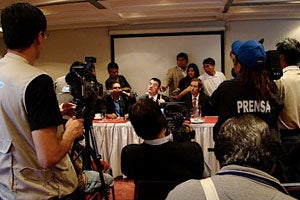The U.S. District Court in the Southern District of Florida has ruled that the claims for crimes against humanity and extrajudicial killings could move forward in two related U.S. cases against former Bolivian President Gonzalo Daniel Sánchez de Lozada Sánchez Bustamante (Sánchez de Lozada) and former Bolivian Defense Minister Jose Carlos Sánchez Berzaín (Sánchez Berzaín). The International Human Rights Clinic at Harvard Law School is part of the legal team that filed the two complaints against Sánchez de Lozada and Sánchez Berzaín.
The two cases – Mamani et al. v. Sánchez Berzaín, and Mamani, et al. v. Sánchez de Lozada – allege that in September and October 2003, the two defendants ordered Bolivian security forces to use deadly force, including high-powered rifles and machine guns, to suppress popular protests against government policies by targeting unarmed civilians in Bolivia’s indigenous Aymara community. During these two months, 67 men, women and children were killed, and several hundred were injured. Both defendants fled Bolivia in late October 2003, and have lived in the U.S. for the past six years.
The clinic has been a part of these two cases since 2007, working with leading U.S. human rights attorneys at the Center for Constitutional Rights as well as lawyers with the law firm of Akin Gump Strauss Hauer & Feld, among others. Students and faculty with the clinic traveled to Bolivia more than a half dozen times conducting fact-finding research for the complaints, and last year attended hearings in Miami on a Motion to Dismiss. That motion survived this month, with Judge Adalberto Jordan ruling that Bolivian plaintiffs have viable claims against Sánchez de Lozada and Sánchez Berzaín.
Thomas Becker ’08 was one of the students that initially helped launch the clinic’s involvement in these two cases. Becker is currently a Human Rights Program Henigson Fellow working in Bolivia.
“Most would think I was foolish to imagine that an idea for a clinical project would develop into a full-blown case against a former head of state, but people at the International Human Rights Clinic were determined to help me make this happen,” said Becker. “Because of the commitment of the professors and students in the Clinic, the victims in Bolivia are one large step closer to justice.”
All told, more than two dozen students have worked on these cases as part of their experience at the Clinic. Several of those students, including Claret Vargas ’10, were able to travel to Miami last year to witness oral arguments for the Motion to Dismiss and meet with several of the Bolivian plaintiffs, all of whom made their first trip to the U.S. to see their former President and Defense Minister in a court of law.
“Working on Alien Tort Statute litigation has been a central part of my experience with the International Human Rights Clinic,” said Vargas. “Aside from the opportunity to learn about the nuts and bolts of ATS litigation from some of the country’s leading experts in the field, I had the honor of meeting and learning from many of the courageous plaintiffs and lawyers in Bolivia who are still fighting for justice so many years after the terrible events of September and October 2003.”
The plaintiffs that the International Human Rights Clinic is representing have all brought claims on behalf of a deceased relative who was killed by security forces commanded by the defendants. Among these plaintiffs are Eloy Rojas Mamani and Etelvina Ramos Mamani, whose eight-year-old daughter was killed in her mother’s bedroom when a single gunshot was fired through a the window, and Felicidad Rosa Huanca Quispe, whose 69-year-old father was shot and killed along a roadside.
“The students and faculty that have worked on this matter for the past three years have demonstrated a remarkable commitment to pursuing justice for the Bolivian plaintiffs,” said Clinical Professor James Cavallaro, the executive director of the Human Rights Program. “This judgment is a powerful example of how international law is making it harder for those who abuse human rights to escape accountability simply by fleeing to another country.”
The original complaints against Sánchez de Lozada and Sánchez Berzaín were filed in September 2007. This week’s decision grants in part and denies in part the defendants’ motion to dismiss, allowing the case to move forward for most of the ten Bolivian plaintiffs represented by the International Human Rights Clinic.
